Greetings from your Texas Capitol! To put it simply, we are now deep in the throes of the legislative session. The Senate has been very busy in our best efforts to get good bills sent to the House of Representatives and eventually to Governor Abbott’s desk to ultimately be signed into law. I have a lot to update you on, so let’s dive in!
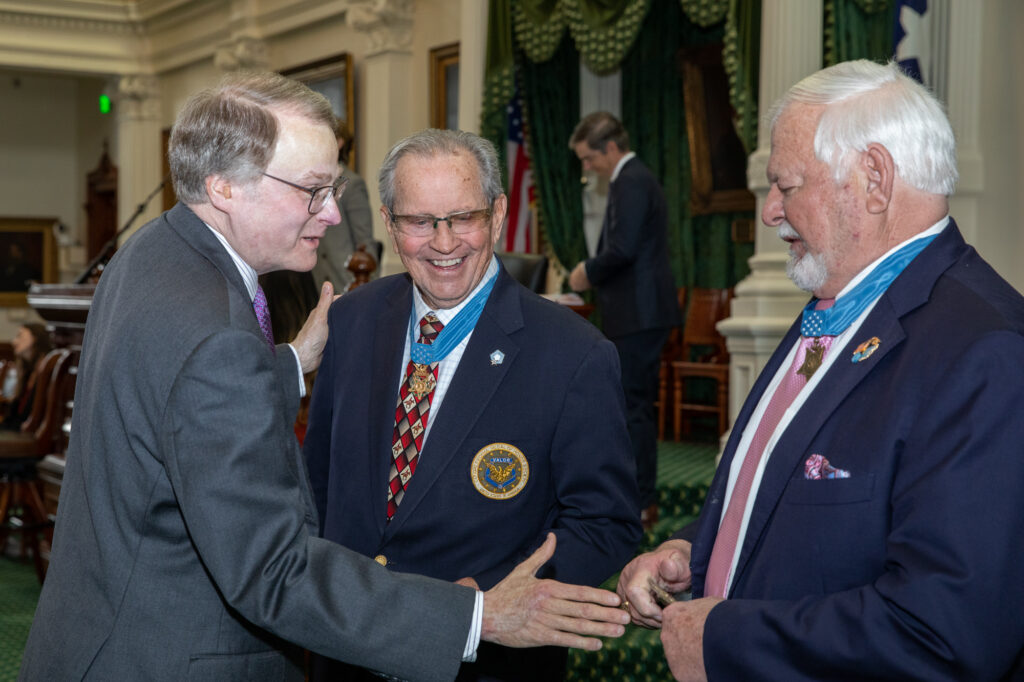
Medal of Honor recipients, Major General Pat Brady (US Army, Ret.) and Lieutenant Mike Thornton, (US Navy, Ret.), were honored on the Senate floor while promoting the National Medal of Honor Museum that is coming to Arlington. I was excited to give them both one of my challenge coins!
My Legislation That Have Passed the Senate
In the past Capitol Updates I provided you with a thorough breakdown of all of the legislation I have filed this session. I wanted to take a moment to update you on the several bills I authored that have made it through the Senate and are now over in the House of Representatives. As well as which representative will be shepherding it through their legislative body.
- SB 29 – Ban on COVID-19 Restrictions Ban (House Sponsor -Rep. JM Lozano)
- SB 599 – District Clerk CHL (House Sponsor – Doc Anderson)
- SB 600 – Increasing the Minimum Penalty for Human Smuggling (House Sponsor -Rep. JM Lozano)
- SB 602 – Authorize Border Patrol to Make Felony Arrest of State Crimes (House Sponsor – Rep. Sam Harless)
- SB 784 – State Primacy of Greenhouse Gas Regulation (House Sponsor – Rep. Brooks Landgraf)
- SB 786 – Geothermal Energy Well Regulation Consolidation (House Sponsor – Rep. Drew Darby)
- SB 1017 – Texas Fuel Choice (House Sponsor – Rep. Brooks Landgraf)
- SB 1104 & SJR 58 – Rebalancing Emergency & Disaster Powers (House Sponsor – Rep. Shelby Slawson)
- SB 1167 – Waco Qualified Hotel Project (House Sponsor -Rep. Doc Anderson)
- SB 1420 – Hotel Occupancy Tax amd Qualified Hotel Projects Transparency Measures and Clean Up (House Sponsor -Rep. Doc Anderson)
- SB 1900 – Defining and Creating Criminal Penalties for Foreign Terrorist Organizations (House Sponsor -Rep. Ryan Guillen)
- SB 2424 – Improper Entry by a Foreign National
- SJR 35 – Non Citizen Voter Ban (House Sponsor – Rep. Charlie Geren)
- SJR 52 – Convention of States Call – Eight Year Extension (House Sponsor – Rep. Travis Clardy)
- SJR 59 – Increasing the Time the Legislature May Act on Bills during a Regular Session (House Sponsor – Rep. John Raney)
Texas Senate Passes Power Grid Reform Legislation
Last week, the Texas Senate passed several bills related to the ongoing improvements to the power grid in Texas. The package includes Senate Bill 6, Adding New Natural Gas Plants, SB 7, Continuing to Improve the Texas Grid, SB 2010, SB 2011, SB 2012, SB 2013, and Senate Joint Resolution 1, by Sen. Charles Schwertner, R-Georgetown, and SB 1287, SB 2014, and SB 2015 by Sen. Phil King, R-Weatherford. An explanation of several of these bills are below.
SB 6/ SJR 1 – Adding New Natural Gas Plants and the Texas Energy Insurance Fund
- Winter Storm Uri revealed weaknesses in our electricity market, specifically the lack of reliability or more specifically too much reliance on renewables. While reforms from SB 3, 87th Legislative Session, addressed many critical system issues, SB 6/ SJR 1 seeks to address increased reliability related specifically to dispatchable generation. Dispatchable generation refers to sources of electricity that can be programmed on demand at the request of power grid operators, according to market needs, and is not dependent on the weather.
- SB 6 guarantees steel in the ground to serve as the state’s energy insurance policy to ensure more electricity is flowing in our power lines in times of critical need.. It also provides low interest loans for existing dispatchable generators ensuring generators in the state can maintain and improve the state’s current volume of generation resources.
- This bill ensures 10,000 new megawatts through establishing the Texas Energy Insurance Program outside of the competitive market. This would be a true backstop, Insurance Policy that Texans can count on!
- This will support and maintain our current dispatchable generation through a state-backed low cost loan program.
- This proposed constitutional amendment, which if passed by the Texas House of Representatives and signed by the Governor, will be on the ballot for you to vote on this November, providing for the creation of the Texas energy insurance fund and the authorization of other funding mechanisms to support the construction and operation of electric generating facilities.
SB 7 – Continuing to Improve the Texas Grid
- The Texas market is distorted due to federal subsidies targeted at weather dependent generators giving them an unfair market advantage over reliable generators. While these subsidies generally lower prices, they also contribute to a less reliable grid. SB 7 addresses market uncertainty and increases reliability by targeting grants to the dispatchable assets that we need.
- SB 7 seeks to bring balance to the Texas electricity market making sure everyone is equally contributing to reliability through instituting a requirement in a non-discriminatory manner between all types of generation to ensure they can provide power to Texans’ homes and businesses when it is needed. SB & does this through:
- The Firming Reliability Program creates a calculation that ERCOT can use to determine the level of reliability for dispatchable and non-dispatchable generators.
- The Dispatchable Reliability Reserve Service (DRRS) provides incentives to resources that have a runtime of at least ten hours and are available within two hours after deployment, to participate in services that are needed to maintain grid stability and security.
SB 1287 – Reducing Transmission Costs for Consumers
- Transmission and distribution utilities must interconnect new generation facilities. This requires construction of new expensive transmission lines averaging one million dollars per mile and a million dollars per turn. The costs incurred by transmission and distribution utilities to interconnect are then passed on to customers.
- Because generators do not bear the cost of new transmission, there is no incentive for generation companies to consider interconnection costs associated with site selection.
- SB 1287 requires the Public Utility Commission (PUC) to establish an allowance for generation interconnection costs.
- The allowance set by the PUC must take into account average historical interconnection costs and be set with the goal of reducing interconnection costs.
- Costs exceeding the interconnection cost allowance set by the PUC will be paid by the generation company rather than being passed on to consumers.
- The bill encourages generation owners to consider the cost of interconnection when they decide on the siting of their facilities.
- The bill will result in dramatically reduced interconnection costs and lower electricity bills for consumers.
SB 2015 – Dispatchable Energy Goals
- Will give effect to the original intent of the natural gas goal, of at least 50% of the generation in the state would be from natural gas, by including renewable energy in the calculation.
- Replaces the natural gas goal with a goal of dispatchable generation.
- Helps counteract distortions caused by federal and state subsidies that have resulted in an overbuild of renewable generation.
Empowering Parental Rights – Including School Choice Bill Passes the Senate (SB 8)
The Parents Bill of Rights, SB 8, seeks to provide a course correction to put parents back at the center of their child’s school experience. Research has demonstrated that parental involvement in their child’s education is one of the key contributing factors for academic success. SB 8 ensures parents remain a central component of a child’s education by clearly enumerating their rights to direct the moral and religious training of their children in the Education Code and empowering them with the tools to stay aware and involved.
SB 8 includes several revisions to the school district grievance process such as clear timelines to reduce delays and ensure the concerns of parents are addressed in a fair and timely manner. If a school board is unable to satisfactorily resolve a parental grievance, an independent hearing examiner may be appointed to ensure concerns are fairly addressed at the local level.
School districts are prohibited from withholding information from children’s parents, and are required to receive parental consent for the administration of any medical, psychiatric, and psychological treatments or tests. Parents are also given the right to request reviews of instructional material to verify lesson content is age-appropriate and on-grade-level. Instruction concerning sexual orientation and gender identity is prohibited at all grade levels.
SB 8 gives parents the ability to exercise their freedom of educational choice by allowing free transfer between school districts as well as giving public school students the opportunity to attend private school with an Education Savings Account (ESA).
SB 8’s ESA program provides families who leave the public school system, or are enrolling in pre kindergarten or kindergarten for the first time with up to $8,000 in an ESA to be spent on tuition and fees at an accredited private school and other approved educational expenses such as textbooks, uniforms, tutoring, transportation, and academic assessment fees. Various safeguards are put in place for the responsible use of funds and prevent fraud, including random audits of ESAs. Two-thirds of the available ESA positions will prioritize applicants who would otherwise attend a campus with an overall performance rating under of C , D, or F.
No funds allocated for public schools are to be used for the ESA program, which is funded through general revenue. School districts with fewer than 20,000 students will receive $10,000 for five years for each student that leaves the district for the ESA program. The ESA program will cover up to 62,500 students.
Texas Senate Passes Teacher Pay Raises and Empowering Teacher Rights Bill (SB 9) – Co-Authored
Texas is 28th in the nation for teacher pay. SB 9 raises teacher salaries across the board, with additional compensation for teachers in small and mid-sized districts. SB 9 also expands the Teacher Incentive Allotment (TIA) to further reward Texas’ best teachers with increased compensation bonuses. Eligibility for the Teacher Incentive Allotment is also increased so that at least 50 percent of Texas teachers can earn designations that come with additional pay.
Teacher workloads are currently unsustainable and are a leading contributor for educators leaving the profession. Teachers should be focused on their main duty – educating children. SB 9 protects teacher time by providing support that seeks to limit how much time a teacher spends outside of their assigned work calendar. Workloads may be further reduced through innovative strategic staffing and funding methods already implemented in some Texas school districts. SB 9 creates support for districts to learn from already-successful districts and the implementation within their own district.
SB 9 provides further support for teacher workloads through the implementation of a grant program for districts that wish to rehire experienced retired teachers, but cannot afford the exorbitant retiree-rehire surcharges.
Disruptive students and the lack of discipline support from school administrators is another key issue for teachers. Many teachers have reported sending a student to the principal for discipline issues, only for them to return to the classroom on the same day, if not the same period. SB 9 requires school districts to receive written consent from teachers before returning a disruptive student to their classroom.
While supporting Texas teachers is paramount, considerations must also be made to properly prepare the next generation of teachers as well. Research has shown that the more time student teachers spend in classrooms before they graduate, the better the outcomes are for students and teachers alike. SB 9 establishes the Texas Teacher Residency Partnership Program so that student teachers, much like medical doctors, can spend more time in the classroom honing their skills alongside a mentor teacher.
SB 10 (Huffman) – Supplemental Funding for Retired Educators Unanimously Passes the Senate – Joint-Authored
In 2019, the Legislature made sweeping changes to the TRS pension fund in hopes that it would put the fund on a path toward actuarial soundness, pay down the unfunded liability, and eventually enable the Legislature to grant TRS retirees a much-needed cost-of-living adjustment.
First, the bill provides a $7,500 stipend to eligible retirees that are 75 years of age and older. We have heard for years that our most vulnerable retirees are struggling to pay bills, and this targeted payment brings immediate financial relief to nearly 186,000 retirees.
Second, this plan provides a 2% cost-of-living adjustment to eligible retirees that retired between September 1, 2013 and January 1, 2022. This COLA would impact approximately 176,000 annuitants.
And finally, it provides a 4% cost-of-living adjustment to eligible retirees that retired prior to September 1, 2013. This COLA would impact approximately 270,000 annuitants.
SB 10 achieves all of this while still keeping the retiree pension fund actuarially sound. The Legislature is expected to appropriate approximately $4.717 billion to pay for these benefit enhancements.
Texas Senate Unanimously Passes SB 22 (Springer) – Assisting Rural Law Enforcement Funding – Increasing Pay and Needed Equipment – Co-Authored
SB 22 establishes the Rural Sheriff’s Office Salary Assistance Grant Program and the Rural Prosecutor’s Office Salary Assistance Grant Program. These programs are available to sheriff’s and prosecutor’s offices located in the 236 Texas counties with a population of less than 300,000. SB 22 provides $350 million to help increase sheriff, deputy, jailer, and prosecutor pay, hire their backups, and purchase much-needed vehicles, firearms, and safety equipment.
Small, usually rural, communities have the same problems that their counterparts in large communities have, including substance abuse, violent crime, and homelessness. Small communities have small tax bases, which results in less funding for personnel, training, equipment, technology, and other resources that law enforcement need to prevent crime and maintain public safety. Recognizing the need to provide consistent quality law enforcement across Texas, SB 22 ensures quality law enforcement across the State, regardless of the county’s size.
SB 28 and SJR 75 (Perry) – Addressing Texas’ Future Water Needs Passes Senate Unanimously
Senate Bill 28 and SJR 75 establish the Texas Water Fund and the New Water Supply Fund which will create a solid future for water infrastructure and supply in the state.
SB 28 directs the Texas Water Development Board (TWDB) to use funding from the Texas Water Fund in existing programs at the TWDB so as not to create more bureaucracy and get financial assistance to water systems quickly.
SB 28 directs the TWDB to commit funding from the New Water Supply Fund to fill the gap in resources for the future. Large scale projects like desalination facilities or water from other states are all on the table.
Older water infrastructure in the state is leaking 136 billion gallons per year. SB 28 creates the Texas Water Fund to help fund projects to fix aging pipes and infrastructure.
Other Lt. Governor Priority Legislation that has Passed the Senate
- Protecting Children from Sexualized Performances Legislation (SB 12 (Hughes) and SB 1601 (Hughes)) – Co-Authored
- A recent cultural trend has been for drag shows to be performed in venues generally accessible to the public, including children. These shows often contain highly sexually suggestive performances.
- SB 12 amends current law relating to restricting certain sexually oriented performances on public property, on the premises of a commercial enterprise, or in the presence of a child, authorizes a civil penalty, and creates a criminal offense.
- The bill is not intended to stop theatrical or other similar exhibitions. Municipalities are authorized to regulate such shows as they see fit.
- While drag shows have received the most media attention, SB 12 is not limited to this type of sexually oriented performance. Drag shows today may be replaced by other types of harmful performances in the future. SB 12 applies to and will protect children from sexually oriented performances in general.
- In recent years a national 501c(3) called “Drag Queen Story Hour” has begun to encourage and host events in libraries across the country. Several municipal libraries in Texas have hosted such events. The state provides public money and grants to municipal libraries. SB 1601 amends current law relating to prohibiting municipal libraries that host certain events from receiving state funding.
- SB 1601 would deny state funding to municipal libraries that host drag story hours or otherwise host events where persons presenting as the opposite sex read books to children for entertainment.
- SB 14 (Campbell) – Children’s Gender Protection Act – Co-Authored
- This bill prohibits medical professionals from providing puberty-inhibiting drugs (most commonly used are Gonadotropin-Releasing Hormone or GnRH), cross-sex hormones (estrogen and testosterone), and prevents surgical interventions to children under 18 for the purpose of altering a child’s biological characteristics to align with their perceived gender identity.
- SB 14 prohibits the use of public funds to pay for the performance of gender transitioning medical interventions on children or to support any provider, hospital, medical school, or other entity that provides or facilitates the performance of prohibited interventions.
- SB 15 (Middleton) – Protecting Women’s College Sports – Co-Authored
- The Legislature passed a bill last session protecting girls’ sports in K-12, and this bill expands these protections to college sports. SB 15 requires collegiate athletes to compete on the team according to their biological sex, as correctly stated on the birth certificate.
- SB 16 (Hughes) – Banning Critical Race Theory (CRT) in Texas Universities
- SB 16 establishes that public institutions of higher education should be committed to creating environments where students are equipped for participation in the workforce and society while also respecting intellectual diversity. The bill would also prohibit faculty from compelling or attempting to compel students to adopt a belief that any race, sex, or ethnicity or social, political, or religious belief is inherently superior to any other race, sex, ethnicity, or belief.
- SB 20 and SB 21 (Huffman) – Removing District Attorneys & Judges Who Refuse to Follow Texas Law
- Senate Bill 20 bars prosecuting attorneys from refusing to prosecute a class or type of criminal offense, other than to comply with an injunction, judgment, or order issued by a court. A prosecuting attorney who violates these provisions commits “official misconduct” and would be subject to removal under Chapter 87, Subchapter A of the Local Government Code.
- Senate Bill 21 would expand the Legislature and Commission on Judicial Conduct’s ability to investigate a judge when there is persistent or willful violation of the enumerated requirements for setting bail under Article 17.15, Code of Criminal Procedure, including the consideration of the safety of the community, law enforcement, and victim.
Additionally, the bill would establish more expedient review of complaints submitted to the commission regarding judicial misconduct and limit a judge’s ability to serve as a visiting judge if they have received multiple sanctions from the commission.
- SB 23 (Huffman) – Creating A Mandatory 10-Year Prison Sentence for Criminals Committing Gun Crime
- Since 2019, Texas has seen a massive spike in violent crime with the use of a firearm. To combat this, mandatory sentences act as a potential deterrent for anyone considering illegally using a firearm and are a tool for prosecutors to keep violent criminals off the streets.
- SB 23 establishes a 10-year mandatory minimum sentence for the use of firearms in the commission of the most severe felony offenses under Article 42A.054, Code of Criminal Procedure. To be eligible for the 10-year mandatory sentence, the bill requires an affirmative finding that the deadly weapon used in the commission of the crime was a firearm.
- SB 24 (Kolkhorst) – the Thriving Texas Families Act
- SB 24 codifies the “Texas Pregnancy and Parenting Support Network” (formerly known as the Alternatives to Abortion program) in order to fund services to families to promote healthy pregnancy and childbirth, family formation, and help families achieve economic self-sufficiency.
- This bill combines support programs at the Department of Family Services with existing maternal care and pregnancy support services under the Health and Human Services Commission (HHSC), creating a one-stop portal for a variety of services for Texas mothers, children and families.
- SB 25 (Kolkhorst) – Creating New Scholarships for Nursing Students
- SB 25 grants authority to the Texas Higher Education Coordinating Board to establish programs to help with student loan repayment and scholarships for registered nurses and licensed vocational nurses as well as nurses who are seeking or have already achieved advanced degrees to become nursing faculty.
- The Nurse Faculty Loan Repayment Program (NFLRP) and the Nursing Innovation Grant Program (NIGP) are two key programs that were created to help address this shortage. The NFLRP improves access to nursing education programs by encouraging qualified nurses to serve as faculty at eligible Texas institutions of higher education through loan repayment assistance. The NIGP was established to provide grants to higher education institutions to promote the education, recruitment, and retention of nursing students and qualified faculty.
- SB 25 is part of a comprehensive package to dramatically increase funding and resources to nursing education and training programs, including those addressed in SB 25.
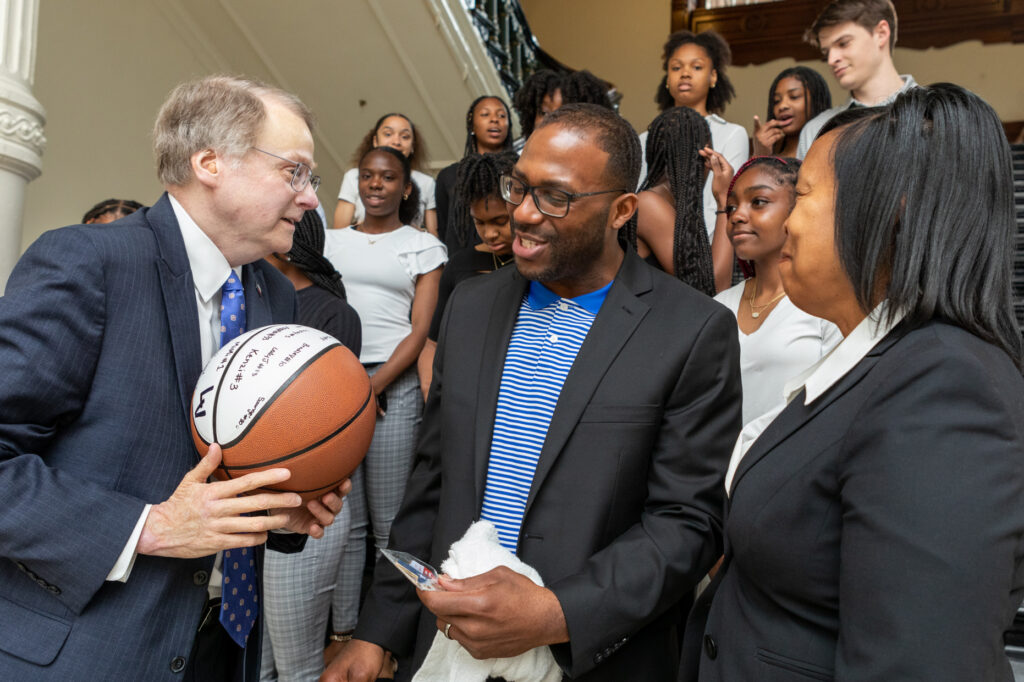
Senate District 22 is a Basketball District! Pictured above with 4A State Champions La Vega HS Girls Basketball team, their Head Coach Marcus Willis, and Superintendent of La Vega ISD, Dr. Sharon Shields; Pictured below with Lipan HS Boys and Girls HS Basketball teams who both are 2A State Champions!
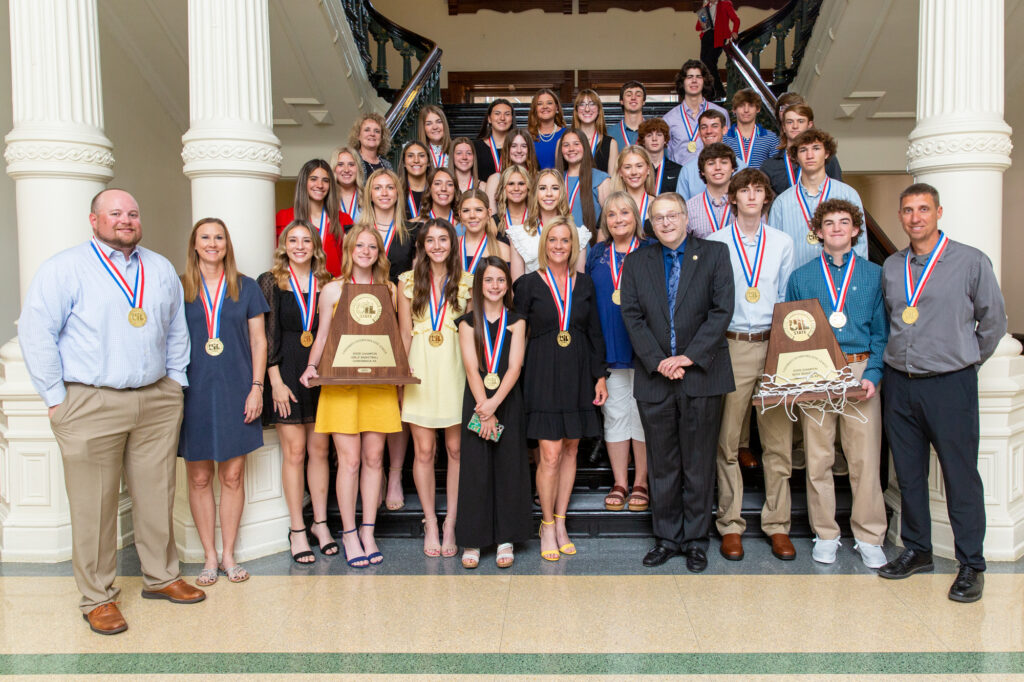
Additional Bills of Interest
We receive a lot of communication from constituents and Texans from all over the state about their opinion on bills moving through the legislative process. I thought I’d include a few these and other bills I thought might interest you that have been voted out of the Senate.
- SB 175 (Middleton) – SB 175 seeks to address concerns of a general lack of transparency regarding public spending on lobbying activities, by prohibiting the use of public funds by political subdivisions for hiring or contracting with a person required to register as a lobbyist.
- SB 221 (Bettencourt) – SB 221 prevents local governments from misleading voters at the polls with deceptive proposition ballot language, spending taxpayer dollars to ignore lawfully collect petition signatures, and suppressing petitions by those they were sworn to protect.
- SB 224 (Alvarado) – This legislation came from interim hearings Sen. Whitmire and I held in our respective committees this interim (Senate Committee on Criminal Justice and Senate Committee on Natural Resources and Economic Development). SB 224 creates a presumption of illegal possession for those who possess two or more catalytic converters, adds a specific theft offense in the Penal Code for catalytic converter theft, and creates a penalty enhancement for those who possess a firearm while committing the theft.
- SB 412 (Paxton) – SB 412 improves student and faculty awareness of pregnant and parenting college students’ rights to ensure that these students receive the accommodations and protections to which they are entitled to eliminate unnecessary and illegal barriers to these students’ college education, and in turn empower pregnant and parenting college students to stay in school and finish their degrees.
- SB 1238 (Nichols) – SB 1238 adapts the states framework established last session for broadband expansion. This will maximize the federal dollars available to the state through the Federal Infrastructure Investment and Jobs Act. The goal is to help get broadband internet access to the nearly 3 million Texas households still without it while ensuring that tax dollars are spent in an efficient and coordinated manner.
- SB 1427 (Flores) – Similar to a combination of my SB 600 & SB 1900, SB 1427 defines a foreign terrorist organization, enhances penalties for smuggling and continuous smuggling to a minimum of 10 years imprisonment. This will put the State in line with Federal human trafficking and smuggling laws.
- SB 1486 (Bettencourt) – Currently, there is no entitlement for a taxpayer to make electronic property tax payments. The Texas Tax Code authorizes electronic payments at the discretion of the tax collector. Thus, some tax collectors offer electronic payment, and some do not. SB 1486 authorizes a taxpayer option for electronic property tax payments in all counties.
Tracking Legislation
In the final two months of a session, bills move more and more rapidly through the Legislature. Because my staff frequently receive calls at the Capitol and District offices asking about the status of specific bills or issues, we wanted to share this helpful infographic outlining what can sometimes be a convoluted process. While swift at times, this process is purposefully transparent, and I think it’s essential for citizens to follow along 24/7. Everything outlined in this chart can be found at https://capitol.texas.gov/. I hope this is helpful!
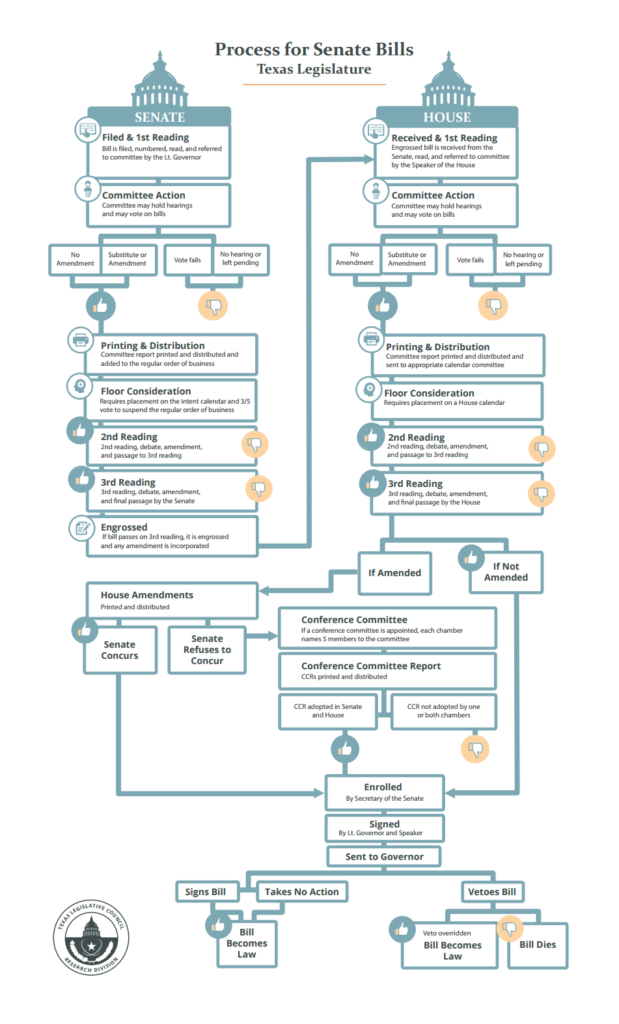 Don’t worry—you can click the image above for a full-size version of the chart.
Don’t worry—you can click the image above for a full-size version of the chart.
Capitol Visits from SD-22
I have enjoyed the honor of welcoming numerous constituents and elected officials from Senate District 22 at the Capitol! Since the last Capitol update we’ve hosted citizens from Arlington, Waco, West, Cranfills Gap, and Hood County who made the trek to Austin in the last few weeks to learn about the legislative process and voice their questions and concerns about Texas public policy. It is always my pleasure to see them and answer their thoughtful questions about the work of the Legislature, and to visit about the direct impact our work will have on them, the citizens we serve.
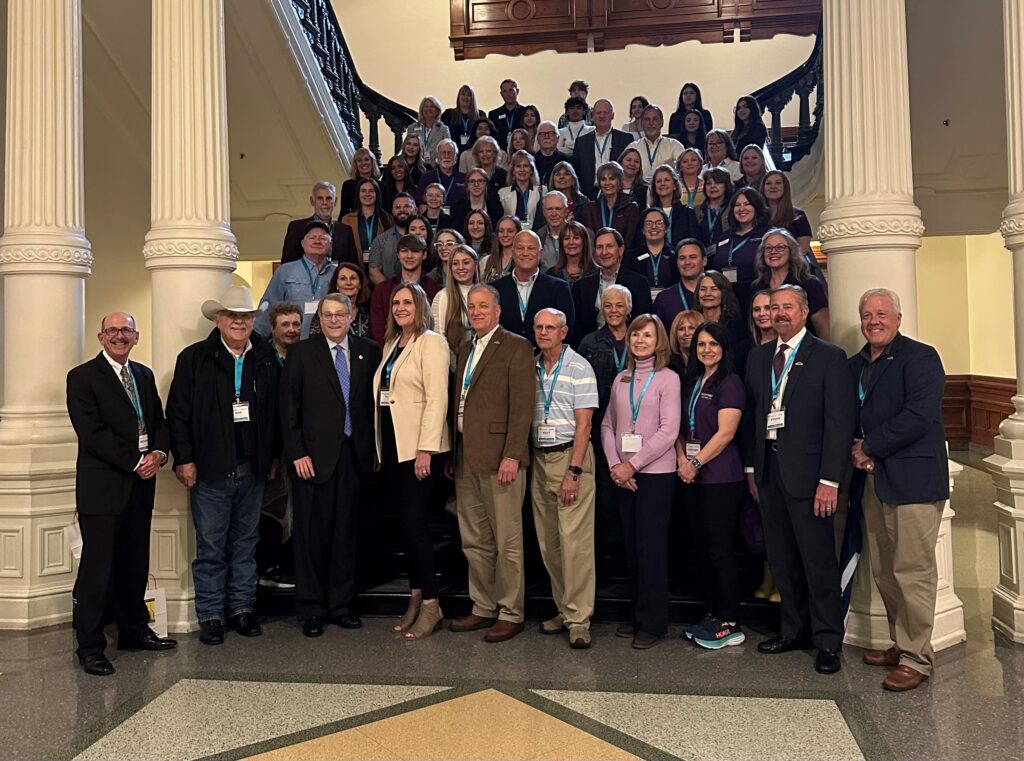
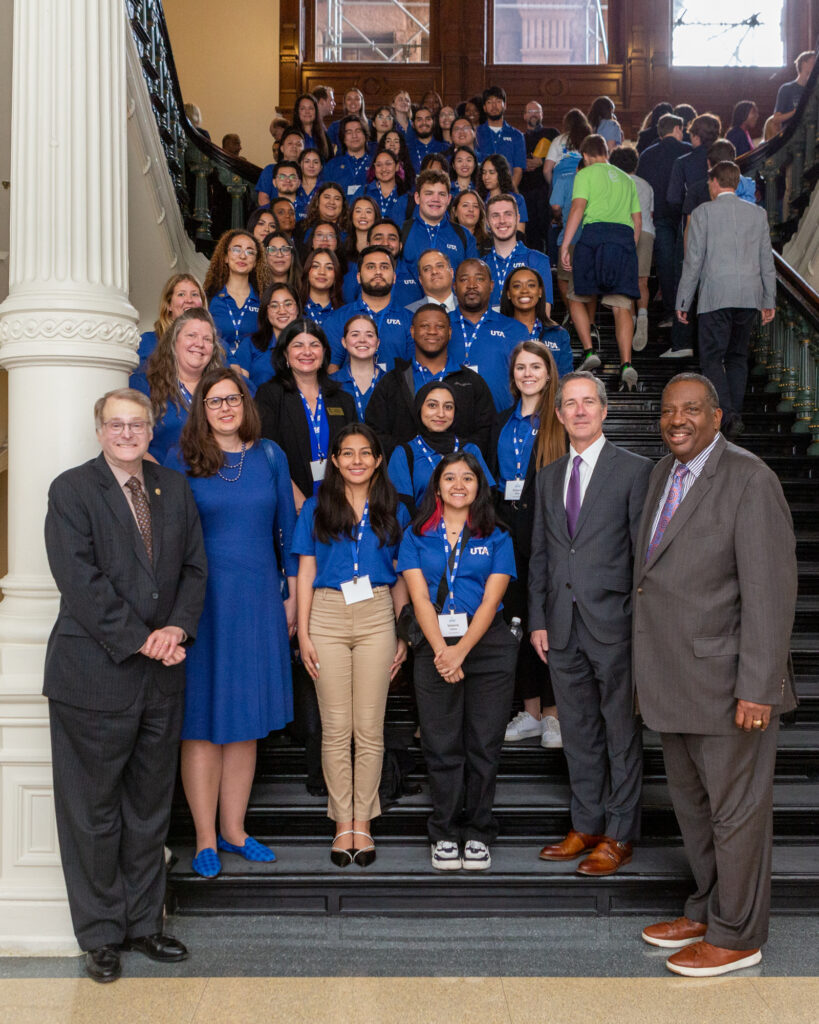
Above left, I was excited to have my home county in town for Hood County/ Granbury Day at the Capitol; Above right, Pictured here with UT Arlington President, Dr. Jennifer Cowley, Senator Hancock, and Senator West with the UT Arlington Students on March 22nd who were visiting for Tarrant County Days; Below left, Mayor Muska of West, TX and myself in my Capitol office; Below right, Lt. Governor Patrick joined the delegation from McLennan County who were in town for Waco Day at the Capitol.
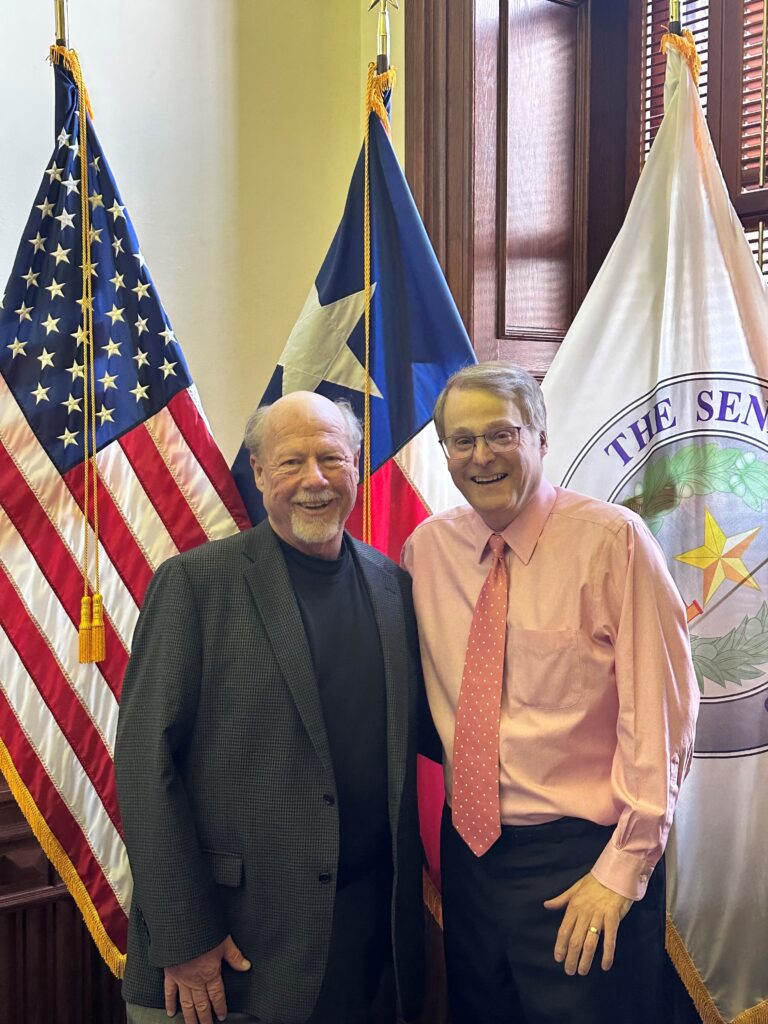
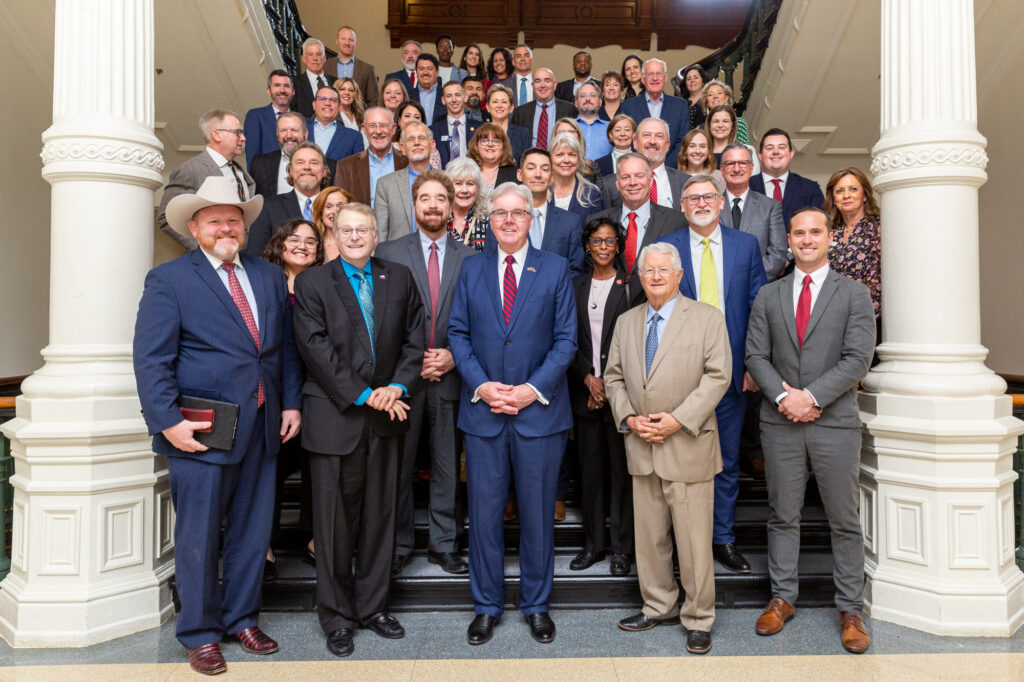
As always, I hope our Capitol Update is informative and that you’ll share it with your friends, family, and colleagues in Senate District 22, who may subscribe to the Capitol Update by clicking here. If you missed any of my previous Capitol Updates and want to read them too, you can find them here!
God bless,

Brian Birdwell
State Senator, District 22
Austin: (512) 463-0122 // Waco: (254) 776-6225 // Granbury: (817) 573-9622
[email protected] // www.senate.texas.gov
